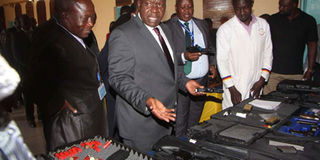State seizes 6,000 illegal guns, seeks proper solution to menace

Interior Cabinet Secretary Fred Matiang'i, Firearms Licensing Board chairman Charles Mwongera Mukindia and other officials view guns surrendered at the board's headquarters in South C, Nairobi, on February 26, 2019. PHOTO | KANYIRI WAHITO | NATION MEDIA GROUP
What you need to know:
- Interior Cabinet Secretary Fred Matiang’i gave the report on Friday, saying the government will burn the fresh batch in two months.
- In November 2019, President Uhuru Kenyatta presided over the destruction of 8,700 illegal firearms and 366,000 bullets.
- Kenya’s history of publicly burning illegal firearms, which dates back to 2003, is in respect to several United Nations (UN) commitments to eradicating trade in small arms and light weapons.
The government has seized another 6,000 illegal firearms, only two months after another 8, 000 guns were destroyed.
Interior Cabinet Secretary Fred Matiang’i gave the report on Friday, saying the government will burn the fresh batch in two months.
“We have been piling the firearms that we have actively been mopping up across the country. We will destroy them soon," he said but noted that the issue of illegal firearms remains in areas experiencing conflict.
The CS said the situation shows there is a “serious problem” when it comes to checks against movement of illegal goods into the country.
He said, therefore, that security agents must focus on the smuggling of guns and other illegal items as Kenya cannot keep confiscating and burning the weapons.
Dr Matiang'i also noted that the illicit trade generates direct and indirect revenue for terrorists and other criminals.
He spoke in Mombasa during a conference on establishing a legal framework for tackling transnational organised crimes.
COMMITMENTS
In November 2019, President Uhuru Kenyatta presided over the destruction of 8,700 illegal firearms and 366,000 bullets.
Kenya’s history of publicly burning illegal firearms, which dates back to 2003, is in respect to several United Nations (UN) commitments to eradicating trade in small arms and light weapons.
The commitments include the UN Firearms Protocol of 2001, the Arms Trade Treaty of 2013 and the Sustainable Development Goals of 2015.
The firearms were seized during a crackdown and the vetting of gun holders that Dr Matiang’i launched last year.
CRIME SYNDICATES
The CS had issued an ultimatum on the surrender of the weapons for verification by the Firearms Licensing Board.
At least 4,000 civilian firearm holders were declared armed and dangerous following expiry of the ultimatum last year.
Regarding the bureau, Dr Matiang’i said the government was focused on a clean-up as it has long allowed criminal syndicates to help applicants acquire licences by manipulating the systems and bypassing stringent rule.
DEALERS
Kenyan civilians had acquired 70,000 guns for personal use by June 2018, Geneva-based Small Arms Survey says.
However, not more than 10,000 of them had been registered by last year.
In January, the CS suspended issuing of new licences to firearm dealers as part of efforts to reduce the number of illegal weapons in the wrong hands.
He said that by last year, the government had managed to reduce the number of firearm dealers in the country from 33 to 15.
PROTEST
Some lawmakers had protested against the crackdown, saying it left them exposed to criminals.
Hundreds of thousands of firearms were also recovered in the North Rift and some National Police Reservists (NPR) disarmed.
The operation further saw Dr Matiang’i introduce biometric cards for gun holders.





